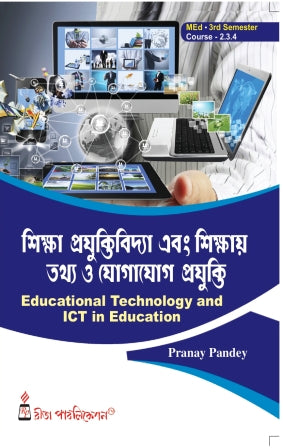Course-2.3.4_Siksha Prajuktibidya ebong Sikshay Tathyo O Jogajog Prajukti(MEd_3rd Sem)
Course-2.3.4_Siksha Prajuktibidya ebong Sikshay Tathyo O Jogajog Prajukti(MEd_3rd Sem) is backordered and will ship as soon as it is back in stock.
Couldn't load pickup availability
Genuine Products Guarantee
Genuine Products Guarantee
We guarantee 100% genuine products, and if proven otherwise, we will compensate you with 10 times the product's cost.
Delivery and Shipping
Delivery and Shipping
Products are generally ready for dispatch within 1 day and typically reach you in 3 to 5 days.
Author: Mr. Pranay Pandey
Syllabus:
Educational Technology
Unit I: Concept of Educational Technology
- Meaning and Nature of Educational Technology
- Meaning and Nature of Instructional technology
- Information and Communication Technology
- Emergence of Educational Technology as a discipline
- Definitions, Scope, Functions and Objectives of Educational Technology
- Approaches to Educational Technology:
- Media Approach
- Audio-Visual Approach - Development of Communication Theory, Communication Models, Mass Communication, Convergence of Communication and Educational Technology
- Cybernetics (System Approach) ?? Origin of system concept, characteristics and stages of instructional system, general and instructional system theory
Unit II: Concept of Instructional Design
- Meaning and Need of Instructional Design
- Implications of learning theories for Instructional design
- Behavioural Learning Theories
- Social Learning Theories
- Cognitive and constructivist Learning Theories
- Theory of multiple intelligences and its implications for instructional design
- Developing a personal learning theory
- Types of Learning and learning styles. Instructional Design Models
- ADDIE Model
- System Model
- ASSURE Model
- ARCS Model
ICT in Education
Unit I: Digital Technology & Socio-Economic Context
- Concept of ICT
- Technological Determinism & Developmental Challenges
- Technology Integrated Education: Management Information System Series
- Media Crowd & Media Culture
- High Tech & High Touch
?Unit II: Information Age Skills
- Info-Savvy Skills: Asking, Accessing, Analyzing, Applying & Assessing
- Techno-Pedagogic Skills
- Media-Message Compatibility
- Media Designing
- Integration of message, media and modes
- Proximity of Message Forms
- Media Language Proficiency
- Media Choice
- Media Credibility
- Message Authenticity
- Digital Skills: Functional Literacy skills, Scientific Literacy skills, Technological Literacy skills, Functional Literacy, Information Literacy skills, Cultural Literacy skills, Global Awareness skills
Unit III: ICT Integrated Education
- On line Admissions
- Digital Lesson Designing
- Evaluation Rubrics
- E-Portfolios of Learners
- Time-Space-Personnel Management
- Learning Resources Management
- Web Based Instruction
- Office Automation
- Online Research
- E-guidance & Counselling
- E-modules
- E-learning Resources
Unit IV: ICT supported Teaching-Learning Strategies
- E-Learning and Web base learning?concept, features and educational application
- Co-operative and Collaborative Learning?concept, features and educa?tional application
- Project based Learning?concept, features and educational application
- Communication Tools?Mobile, e-mail, chat Online Conferencing, Blog, Wiki, Internet forum, News Groups
- Unit V: New trends in ICT l Virtual Classroom?Concept, Elements, Advantages and Limitations
- Smart Classroom?Concept, Elements, Advantages and Limitations
- Edusat?Concept, Elements, Advantages and Limitations
- Online Learning Resources: e-Library, Websites, Apps, and Web 2.Technology Social networking as an effective communication tool





